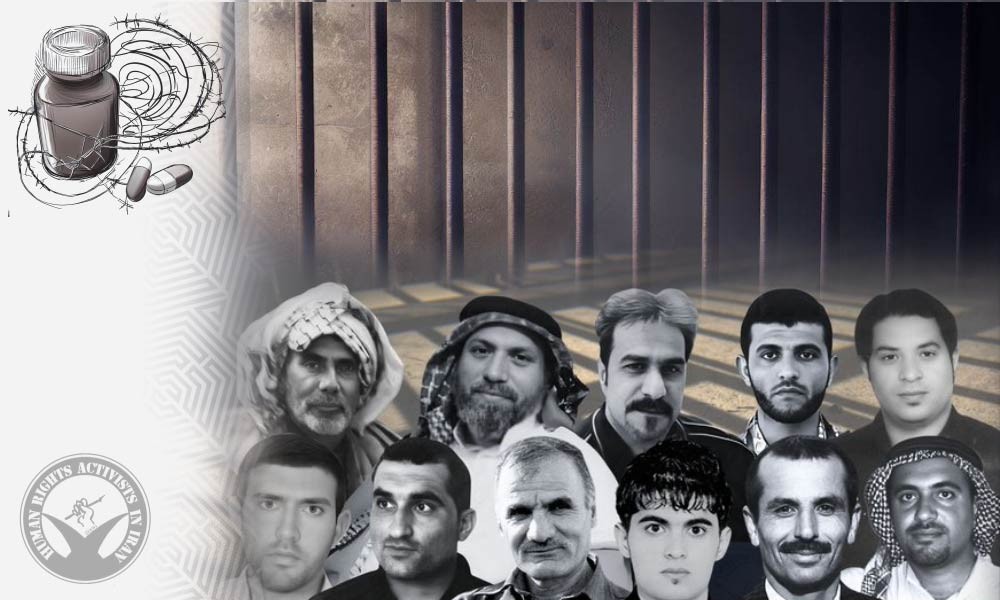According to recent testimonies from released Ahwazi prisoners, conditions in prisons like Sheiban have significantly deteriorated in recent months. These prisoners describe their facilities as “living cemeteries,” overcrowded, with drug-addicted prisoners, many suffering from highly infectious diseases like tuberculosis, hepatitis B, and HIV/AIDS.
In a series of interviews with the Dialguge Institute, the freed Ahwazi political prisoners reported that “whether they were political or non-political prisoners, the condition and abusive treatment of Ahwazi detainees were the same as they were all denied regular treatment and basic necessities.”

When Ahwazi political prisoners protest against the absence of hygiene and the lack of any possibility of treatment outside prison, they are subjected to torture by prison staff. As an additional form of punishment, these political prisoners are then transferred to the cells of prisoners convicted of murder and drug abuse, which are notorious for being rife with highly infectious diseases.
The Iranian regime has refused to allow international human rights organisations or the UN fact-finding committee to visit these prisons, preventing any thorough investigation into human rights violations.
In Ahwaz Central Prison (Sheiban), the plight of Ahwazi Arab political prisoners has reached alarming levels, with reports from the Karun Human Rights Organisation highlighting severe neglect and denial of essential medical treatment. This disturbing pattern of mistreatment underscores the broader repression faced by the Ahwazi people.
Abdulemam Zaeri, a political prisoner who has endured 18 years of a life sentence, is currently suffering from a chronic and severe ear infection that has significantly impaired his hearing. This infection, now at a critical stage, is compounded by separate prostate and gastrointestinal issues that demand immediate and continuous medical care. Despite the gravity of his medical condition, prison officials and the regime’s intelligence department have obstructed his access to essential hospital treatment or medical leave. This callous neglect poses a serious threat to Zaeri’s life and starkly reflects the regime’s typical contempt for human rights and legal obligations.
Similarly, Wassam Mazraeh, another political prisoner held in Ward 8, is battling cancer and requires urgent medical intervention outside the prison. Having served three years of a five-year sentence, Mazraeh has been denied access to essential cancer medication by prison authorities. The prison pharmacy is devoid of the required drugs, and officials have imposed stringent restrictions on the admission of medications for inmates with specific medical needs. This denial of care further exacerbates the horrendous suffering of an already vulnerable individual.
Numerous other political prisoners in Shiban Prison are also enduring extremely harsh conditions. Reports indicate that at least 95 Ahwazi Arab political prisoners are currently languishing in dire conditions in the infamous prison, suffering from a range of health problems, including cancer, heart disease, various infections, gastrointestinal disorders, multiple sclerosis, dental issues, sinusitis, diabetes, prostate problems, and hernias. These prisoners are consistently deprived of proper medical care and access to external medical facilities, intensifying their suffering and endangering their lives.
The situation of Qassim Borwayeh, another Ahwazi political prisoner in Ward 8, further illustrates the severity of medical neglect in Shiban Prison. Borwayeh suffers from severe spinal issues that prevent him from moving or performing basic tasks independently. Despite the urgent need for treatment outside the prison, authorities have taken no action. Borwayeh, who is serving a 15-year sentence handed down by the Revolutionary Court for dissent, exemplifies the cruel disregard for the health and well-being of political prisoners.
The Karun Human Rights Organisation has consistently reported the urgent medical needs of prisoners like Zaeri, Mazraeh, and Borwayeh, emphasising the critical lack of timely medical care by the authorities. The organisation has called for immediate action to provide adequate treatment and prevent further health deterioration among prisoners.
Ahwazi human rights advocates demand that prison and intelligence officials take swift measures to ensure proper medical treatment for political prisoners. The continued neglect and obstruction not only violate basic human rights but also risk causing severe and irreversible harm to the health of those incarcerated.
The situation in Ahwaz Central Prison is a stark reminder of the systemic repression and neglect faced by Ahwazi Arab political prisoners in Iran.
The denial of essential medical treatment is not merely a matter of bureaucratic oversight; it is a deliberate act of cruelty that endangers lives and flouts international human rights standards. The international community must heed the plight of these prisoners and exert pressure on Iranian authorities to uphold their legal and moral responsibilities. The health and lives of Ahwazi political and non-political prisoners in Shiban Prison depend on immediate and decisive action to address these egregious human rights violations.
